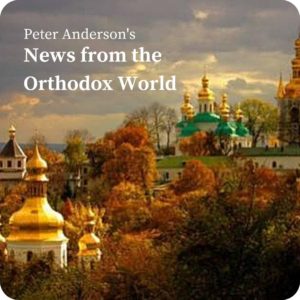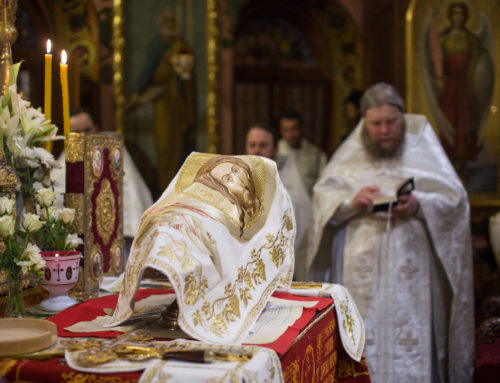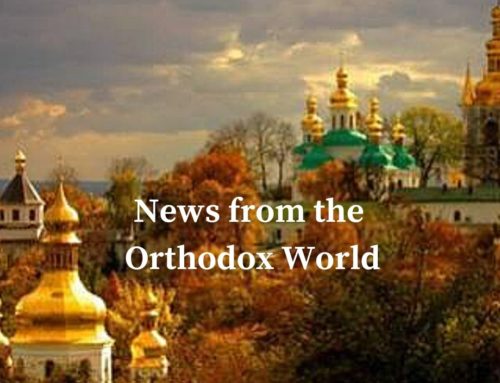Peter Anderson reports from the Orthodox world.
Longstanding reporter of the news from the Eastern Church, Peter Anderson shares our dream of a unified Christianity. His love for Orthodoxy has driven him to this personal mission to share the news of East with the world through his email list. The Urbi et Orbi Foundation is proud to share his efforts and his insights with you.

The hope of all Christians celebrating Easter or Pascha on the same day has been repeatedly raised in recent decades. This year, Orthodox (except for the Orthodox Church of Finland) will be celebrating Pascha on May 2 while Catholics will be celebrating the great feast day on April 4 – a difference of four weeks! The subject of a common Easter date has now been raised in a recent “editorial” written by Orthodox Archbishop Job of Telmessos in the February 2021 issue of the newsletter of the Ecumenical Patriarchate’s Permanent Delegation to the World Council of Churches. Archbishop Job heads this WCC delegation. The editorial can be viewed at https://mailchi.mp/wcc-coe/newsletter-of-the-ecumenical-patriarchates-permanent-delegation-to-the-wcc-february-8249591?e=7fbe2f6ed4&fbclid=IwAR0pceOKrnCQycpRuF5ZQYqI6LBU0XD_QWJk_sl3ALgtdchAkutTav2d9AM (scroll down to the second article). The editorial points out that the Council of Nicaea decided that Pascha should be observed on the first Sunday following the full moon after the spring equinox and that the 1700th anniversary of this Council will be celebrated in 2025. The editorial then describes the history relating to the application of this rule and how the use of different calendars and tables have given rise to the observance of different dates. The editorial concludes:
It is worth mentioning that in 1997, the World Council of Churches held a consultation in order to establish a common date for Easter and recommended maintaining the Nicene norms (that Easter should fall on the Sunday following the first full moon of spring), to calculate the astronomical data (the spring equinox and the full moon) by the most accurate possible scientific means, using as the basis for reckoning the meridian of Jerusalem, the place of Christ’s death and resurrection.
Perhaps, the celebration of the 1700th anniversary of the council of Nicaea in 2025 would be a good occasion to educate Christians on the necessity of a calendar reform and of a common date of Pascha in order to remain truly faithful to the decisions of the first ecumenical council. The fact that the Eastern and Western dates of Easter will coincide on that year should be taken as an encouragement towards that direction!
When asked about this editorial by Archbishop Job, Cardinal Kurt Koch, President of the Pontifical Council for Promotion Christian Unity, informed the media:
The 1700th anniversary of the Council of Nicaea, which set a common Easter date as early as the fourth century, is a good opportunity to find a common Easter date again today. I therefore welcome the move by Archbishop Job of Telmessos, Co-President of our Joint International Commission for Theological Dialogue between the Catholic Church and the Orthodox Church as a whole, and I hope that it will meet with a positive response. It will not be easy to agree on a common Easter date; but it is worth working for it. This wish is also very important to Pope Francis and also to the Coptic Pope Tawadros.
Cardinal Koch’s statement is found at https://www.kath.ch/newsd/oekumene-minister-kurt-koch-will-sich-fuer-gemeinsames-osterdatum-einsetzen/.
Today, March 13, the Russian news agency RIA Novosti reported the reaction of Father Stefan (Igumnov), secretary for inter-Christian relations at the Moscow Patriarchate’s Department for External Church Relations. https://ria.ru/20210313/paskha-1601062309.html According to Father Stefan, the “return of all Christian churches to uniformity in the date of the celebration of Easter would be a great blessing for the Christian world.” However, he also made clear that the Moscow Patriarchate will not change its way of calculating the date of Pascha. Thus, the RIA article states:
He [Father Stefan] stressed that the Paschalion is “a dogmatic position.” “To depart from it means to lose touch with the Orthodox tradition. For the Russian Church, this issue cannot be on the agenda. We adhere to the teachings of the Ecumenical Councils and the Holy Fathers. This makes us Orthodox,” concluded the representative of the Russian Church.
For those not familiar with the “Paschalion,” it is discussed at https://orthodoxwiki.org/Paschalion and https://ru.wikipedia.org/wiki/%D0%9F%D0%B0%D1%81%D1%85%D0%B0%D0%BB%D0%B8%D1%8F. Essentially, the Paschalion is a set of tables developed several centuries after the Council of Nicaea to determine when the paschal full moon would occur in future years. Using both the Julian calendar and a lunar calendar, it was an excellent effort to predict the actual dates of the equinox and full moons, but it was not exact. For centuries, both the Orthodox and Catholic Churches used the Paschalion to determine the dates of the equinox and the paschal full moon as opposed to using physical observations of the sun and moon. During these centuries, Orthodox and Catholics always celebrated Pascha on the same date. By 1582, the errors of the Julian calendar and the Pascalion had caused the calculation of Pascha to be wrong by ten days with respect to the date of the equinox and wrong by approximately four days for the phases of the moon. This caused Pope Gregory XIII to implement the so-called Gregorian calendar in 1582. Unfortunately, the Paschalion does not work well with the Gregorian calendar, and the Catholic Church developed new tables for the new calendar. After 1582, the Orthodox Church and the Catholic Church usually observed Easter on different dates.
Father Stefan seems to be saying that the use of the Paschalion is a matter of dogma and that changing it cannot be “on the agenda.” In contrast, Archbishop Job in his editorial refers to the Paschalion as “old lunation tables” which are not astronomically correct. If Father Stefan’s statement reflects the position of the Moscow Patriarchate, it appears that the only way to obtain a uniform Easter date is for all churches to use the Julian calendar and the Paschalion in calculating the date.
On a different subject, Metropolitan Hilarion today on his television program Church and the World commented on the hopes expressed by Patriarch Theophilos of Jerusalem relating to a gathering of the primates this year. Metropolitan Hilarion’s comments were also posted today on the website of the DECR. https://mospat.ru/ru/news/86772/. The Metropolitan expresses the hope that a meeting in the “Amman format” may take place when the restrictions associated with the pandemic are eased. He states that “we will accept this initiative.” He comments that Patriarch of Constantinople has lost the right to call such as meeting as he has joined the Ukrainian schism. Metropolitan Hilarion believes that even if the Patriarch of Constantinople called a meeting of the primates, “very many [of the Churches] will shy away under various pretexts.”
The news reports relating to the visit of Pope Francis to Iraq last weekend focused on his contacts with Islamic leaders and with the churches in union with Rome. However, he also had contact with other Christian leaders. https://www.christianunity.va/content/unitacristiani/en/news/2021/2021-03-08-francis-with-gewargis-at-erbil1.html His Holiness Mar Gewargis III, Catholicos–Patriarch of the Assyrian Church of the East, attended the papal Mass in Erbil on March 7. During the Mass, he was seated near the altar next to Cardinal Parolin, the Vatican Secretary of State. After the Mass the Patriarch gave Pope Francis a silver chalice. Also at the Mass were were His Grace Nicodemus Daoud Matti Sharaf, Syrian Orthodox Archbishop of Mosul, and His Grace Ghattaz Hazim, Metropolitan of Baghdad and Kuwait of the Greek Orthodox Patriarchate of Antioch.
On March 11 in Venice, His Eminence Polycarpos Stavropoulos was enthroned as the Orthodox Metropolitan of Italy and Exarch of All Southern Europe (Ecumenical Patriarchate). Bishop Brian Farrell, Secretary, and Monsignor Andrea Palmieri, Under–Secretary of the Pontifical Council for Promoting Christian Unity attended. During the ceremony, Bishop Farrell read letters of congratulations both from Pope Francis and Cardinal Koch. On March 4 in Moscow, the first Russian translation of Fratelli tutti, the third encyclical by Pope Francis, was presented in a special program. https://www.blagovest-info.ru/index.php?ss=2&s=4&id=93406 Interestingly, the translation was done and the presentation was planned by Muslim organizations in Russia. Hieromonk Grigory (Matrusov), Chairman of the Expert Council under Patriarch Kirill for Interaction with the Islamic World, represented the Moscow Patriarchate at the presentation and was one of the speakers.
Peter Anderson, Seattle USA


